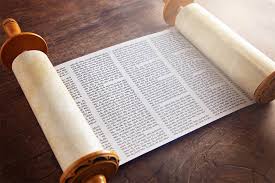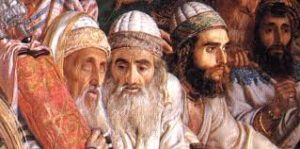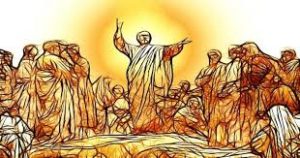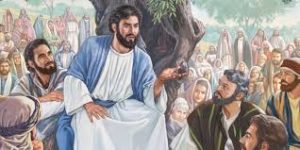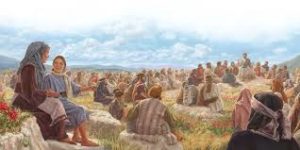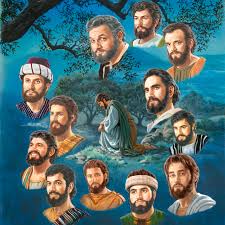Dt – Do Not Worry About Your Life, or What You Will Wear Matthew 6: 25-34
Do Not Worry About Your Life,
What You Will Eat or Drink, or What You Will Wear
Matthew 6: 25-34
Do not worry about your life, what you will eat or drink, or what you will wear DIG: How does you choice of treasure, master and generosity in Matthew 6:19-24 affect your attitude toward life? What does God’s care for the birds and lilies teach you? How does the work ethic fit into this passage? How does faith?
REFLECT: Why pray when you can worry? Why worry about things you can’t control? What does worry rob us of? What causes you to worry the most? What are the signs that indicate you are worrying too much? What do you do to counteract worry in order to concentrate on God’s Kingdom?
In His eleventh example, the Messiah teaches us that, opposed to the Pharisees and Torah-teachers, true righteousness relies on God. Here Messiah expands on the principle of evaluating our inner priorities and values in light of the world around us. Both the rich and the poor have their special problems. The rich are tempted to trust in their possessions (to see link click Dr – Store Up Treasures in Heaven, Where Thieves Do Not Break in and Steal). There, in that file Jesus focused on the attitude toward luxury, or the unnecessary physical possessions people stockpile for selfish reasons. But here, He focuses on the poor who are tempted to doubt God’s provision – the perfectly human connection between money and worry. The heart of Yeshua’s message is that we shouldn’t worry about necessities. He gives us the command: Do not worry three times in verses 25, 31 and 34 and gives us four reasons why worrying is wrong.577
First, worrying is unfaithful because of our Master. Therefore I tell you, do not worry about your life (Greek psuche, meaning all of a person’s being, physical, mental, emotional and spiritual), what you will eat or drink; or about your body, what you will wear. Is not life more than food, and the body more than clothes (Mattityahu 6:25)? Worry is the sin of not trusting the promise and provision of ADONAI, yet because of our fallen nature, is very common. The English term worry comes from an old German word meaning to strangle, or choke. And that is exactly what worry does; it’s a kind of mental and emotional strangulation. Worry is the opposite of contentment, and we should all strive to be able to say with Rabbi Sha’ul: I have learned to be content in whatever circumstances I am. I know how to get along with humble means, and I also know how to live in prosperity; in any and every circumstance I have learned the secret of being filled and going hungry, both of having abundance and suffering need (Philippians 4:11-12; First Timothy 6:6-8 NASB).
Our contentment is found in ADONAI, and only in ADONAI– in His ownership, control and provision. Everything we now have belongs to the Lord, and everything we will ever have belongs to Him. The earth is ADONAI’s, with all that is in it, the world and those who live there; for He set its foundations on the seas and established it on the rivers (Psalm 24:1 CJB). So, if everything is already His, why, then, do we worry about His taking from His children what really belongs to Him? Next, God controls everything. Riches and honor come from You, You rule everything, in Your hand is power and strength, You have the capacity to make great and to give strength to all (First Chronicles 29:12). Lastly, believers are to be content because God provides everything. The supreme Owner and Controller is also the supreme Provider as revealed in one of His ancient names, ADONAI Yir’eh, or The LORD Will Provide (Genesis 22:14a). If Abraham, with his limited knowledge of Ha’Shem, could be so strong and content, how much more should we be who know Messiah and who have His complete written Word? As Paul assures us: And my God will meet all your needs according to the riches of His glory in Christ Jesus (Philippians 4:19).
Second, worrying is unnecessary because of our Father. The basic meaning of these verses is that as believers, we have absolutely no reason to worry because ADONAI is our heavenly Father. It’s as if the Holy Spirit is asking us, “Have you forgotten who your Father is?” To illustrate this point, Jesus shows us how foolish and unnecessary it is to worry about food, longevity, and clothing.

Worry about food: There are many birds in northern Galilee, and it seems that Jesus pointed to some of them flying by as He said: Look at the birds of the air. As an object lesson, He called attention to the fact that birds do not have a complicated process for acquiring food. They do not sow or reap or store away in barns. Like every creature, birds receive their life from God. But, He does not say to them, “OK, I’ve done My part, from now on you’re on you’re on your own.” The LORD has provided them with an abundance of food resources and the instinct to find those resources for themselves and their offspring. And yet your heavenly Father feeds them. If ADONAI so carefully takes care of such relatively insignificant creatures as birds, how much more will He take care of those who are created in His own image and who have become His children through faith?578 Are you not much more valuable than they (Matthew 6:26)?
Worry about longevity: Our culture is obsessed with trying to live longer. We exercise, eat carefully, supplement our diets with vitamins and minerals, get regular checkups, and do everything under the sun in the hope of adding a few years to our lives. Yet, ADONAI knows the year, the day, the hour of our demise. Exercising and the like are fine but they cannot add one hour to our lives. Can any one of you by worrying add a single hour to your life (Mattityahu 6:27)? You can worry yourself to death, but not to life. Dr. Charles Mayo, of the famous Mayo Clinic in Minneapolis, Minnesota, wrote, “Worry affects the circulation, the heart, the glands and the whole nervous system. I have never known a person to die of overwork, but I have known a lot who died of worry.”579
Worry about clothing: The third illustration has to do with clothing, using lilies as a model. Surely many of the people to whom Yeshua spoke had little clothing. Again He must have pointed to their surroundings, this time to lilies, to assure them of ADONAI’s concern and provision. And why worry about clothes? Those beautiful lilies made no effort to grow and had no part in designing or coloring themselves. See how the lilies of the field grow. They do not labor or spin. Yet I tell you that not even Solomon in all his splendor was dressed like one of these (Matthew 6:28-29). The language at this point is especially relevant to the crowd, as Jesus uses a rabbinic principle of interpretation first elaborated in seven principles by Rabbi Hillel (10 AD). Because these principles were used in the days of Christ, it is relevant to understand His words. Here, He uses one of the Middot principles to challenge the faith of His hearers: If God provides for His natural creation, how much more can we be assured that He will provide for those who call Him their heavenly Father?580 Does He supply our wants – sometimes; but does He supply our needs – absolutely.
Despite their beauty, however, lilies do not last long. If that is how God clothes the grass of the field, which is here today and tomorrow is thrown into the fire, will he not much more clothe you – you of little faith (Matthew 6:30)? If the LORD bothers to dress the grass of the field with beautiful but short-lived lilies, how much more is He concerned about His very own children who will live eternally (see Bw – What God Does for Us at the Moment of Faith)? To worry about the necessities of life, Messiah says, is sinful and shows little faith. When we are not in the Word of God daily so that Christ is in our hearts and minds, the Adversary moves into that vacuum and plants the seeds of worry. Rabbi Sha’ul counsels us as he did the messianic community at Ephesus: I pray that the God of our Lord Yeshua the Messiah, the glorious Father, will give light to the eyes of your hearts, so that you will understand the hope to which He has called you, what rich glories there are in the inheritance He has promised His people, and how surpassingly great is His power working in us who trust Him (Ephesians 1:17-19a CJB).
Worry is unreasonable because of our faith. Worry is characteristic of unbelief. So do not worry, saying, “What shall we eat?” or “What shall we drink?” or “What shall we wear?” For the Gentiles run after all these things, and your heavenly Father knows that you need them (Matthew 6:31-32). Those who have no hope in ADONAI naturally put their hope and expectations in things they can enjoy now. They have nothing to live for but the present, and their materialism is perfectly consistent with their worldview. They have no God to supply their physical or spiritual needs, their present or eternal needs, so anything they get they must get for themselves. They are ignorant of the LORD’s provision and therefore cannot draw from it. No heavenly Father cares for them, so there is reason for them to worry.
The gods of the Gentiles were man-made gods inspired by the Destroyer of souls. They were gods of fear, dread, and appeasement who demanded much, promised little and provided nothing. It was quite natural that those who served such gods would run after all these things and seek whatever satisfactions and pleasures they could while they could. Their philosophy is still around today among those determined to live like the devil. Let us eat and drink, for tomorrow we die (First Corinthians 15:32) is an understandable lifestyle for those who have no hope in the resurrection (see my commentary on Revelation Ff – Blessed and Holy Are Those who have Part in the First Resurrection).
But, living like the devil is completely foolish and unreasonable for those who do have hope in the resurrection, for those who’s heavenly Father knows that [they] need the basics of life (Matthew 6:32). To worry about, “What shall we eat?” or “What shall we drink?” or “What shall we wear” demonstrates a lack of faith. When we think like this world and desire the things of this world, we will worry like this world because a mind that is not centered on ADONAI is a mind that has cause to worry. The faithful believer follows the advice of Rabbi Sha’ul when he cautions us: Don’t worry about anything; on the contrary, make your requests known to God by prayer and petition, with thanksgiving (Philippians 4:6 CJB). The faithful believer refuses in any way to be conformed to this world (Romans 12:2 NASB).
Our calling is rather simple – but profound: Seek first His Kingdom and His righteousness, and all these things will be given to you as well (Matthew 6:33). What Jesus is saying to us is, “Rather than seeking and worrying about food, drink and clothing like unbelievers do, just focus your attention and hope on the things of God, and He will take care of your basic needs.” Of all the things in the world, there are two things that we need to seek: God’s Kingdom and God’s righteousness. As we have seen in the teaching of the Disciples Prayer (see Dp – When You Pray, Go Into Your Room and Close the Door), God’s Kingdom is both the messianic Kingdom in the future and God’s sovereign rule now. Instead of longing for the things of this world, we are to be looking forward to the city with foundations, whose architect and builder is God (Hebrews 11:10). But, it is more than longing for something in the future; it is also longing for something in the present – God’s righteousness. We are not only to have heavenly expectations but also lead holy and godly lives (Colossians 3:2-3). Since this world will ultimately be destroyed, what kind of people should we be? We should lead holy lives, as we wait for the Day of God and work to hasten its coming (2 Peter 3:11-12a CJB).
Worry is unwise because of our future. Consider the earth! Our globe’s weight has been estimated at six sextillion tons (a six with twenty-one zeroes). Yet, it is precisely tilted at twenty-three degrees; any more or any less and our seasons would be lost in a melted polar flood. Though our globe revolves at the rate of one-thousand miles per hour or twenty-five thousand miles per day or nine million miles per year, none of us tumbles into orbit.
As you stand observing the LORD’s workshop, let me pose a few questions. If He is able to place the stars in their sockets and suspend the sky like a curtain, do you think it is remotely possible that ADONAI is able to guide your life? If your God is mighty enough to ignite the sun, could it be that He is mighty enough to light your path? If He cares enough about the planet Saturn to give it rings or Venus to make it sparkle, is there an outside chance that he cares enough about you to meet your needs?581
Therefore do not worry about tomorrow, for tomorrow will worry about itself. Each day has enough trouble of its own (Matthew 6:34). This saying has the ring of popular proverbial wisdom. Making reasonable provisions for tomorrow is reasonable, but worrying about tomorrow is foolish. It seems that some people are so bent on worrying that if there is nothing to worry about today they find something to worry about tomorrow. Yeshua says not to do that for tomorrow will worry about itself. Like the manna of old (see my commentary on Exodus Cr – I Will Rain Down Manna from Heaven for You), the LORD only gives us enough grace for one day at a time. Being a follower of Jesus may not be easy, but He promises the presence of the Father and the Holy Spirit along the way. Worry is the greatest thief of joy.
Let there be no confusion, the Bible does not condemn feelings of anxiety or distress. We are counseled to avoid worry over worldly concerns, such as physical needs the Lord has promised to supply. But, a parent’s worry over the spiritual welfare of his or her children is quite in order! However, anxiety should prompt us to approach problems constructively, especially by employing God’s remedy for worry: prayer (Philippians 4:6-7). Let us set aside the notion that worry is sin. It is not. The point is that we shouldn’t go through life with material things becoming a burden to us. We can always find something to worry about; however, with Messiah in control of our lives – why bother?





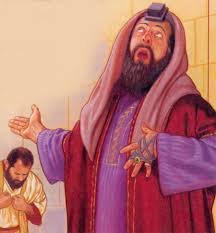

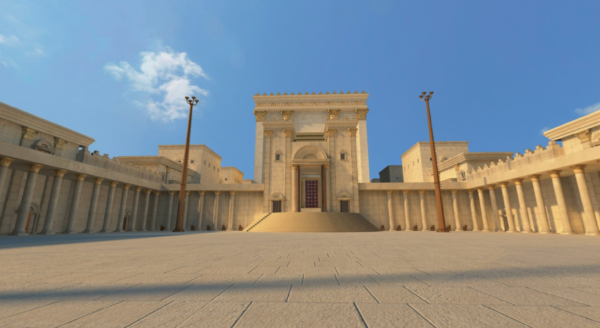 This inner area of the Temple compound was not named because only women could go there. Certainly, it was the common place for worship for all.
This inner area of the Temple compound was not named because only women could go there. Certainly, it was the common place for worship for all. 





